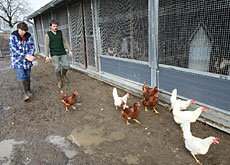Bird flu threatens Swiss poultry farming

Swiss poultry farmers fear that measures to prevent the spread of bird flu pose a threat to the industry, which is largely free-range and organic.
Experts say that if an order by the federal authorities to confine poultry indoors continues indefinitely, Switzerland’s humane methods of raising birds could be seriously undermined.
Swiss hens, which produce more than 700 million eggs a year, are said to enjoy the best conditions in Europe.
Laws introduced in 1981 overhauled the conditions for the rearing and treatment of poultry, notably by banning battery farming.
Until last month, when the government ordered domestic fowl to be confined inside as part of measures designed to halt the spread of bird flu, most birds were allowed to range outdoors.
At present Switzerland has reported one confirmed case of H5N1. Six cases of H5 are being examined at the EU’s Veterinary Laboratories Agency in England.
The H5 virus was found in two dead ducks in a lakeside park in the city of Geneva, western Switzerland, and another infected duck, a swan and a coot were registered on the German border, in northern Switzerland.
Two previous cases affecting a swan and a duck were reported in the same regions.
So far no domestic fowl in Switzerland have tested positive for the disease.
“For 20 years now, Switzerland has been one of the world pioneers in humane methods of raising poultry,” said Ruedi Zweifel, director of Aviforum, the main Swiss poultry farmers’ organisation.
In contrast, the vast majority of birds raised in European Union countries spend their lives cooped up in wire cages – a practice not due to be outlawed until 2012.
Investment
“Swiss poultry farmers have invested heavily in recent years to introduce humane and environmentally friendly methods, putting in a lot of money and hard work,” said Zweifel.
Almost all poultry farms have outdoor-style areas – roofed structures with walls of wire-mesh fencing. Until February 20, around two thirds of laying hens and one third of chickens were kept outdoors.
But farmers fear the spread of the deadly H5N1 virus is threatening these improvements.
“If it were to last, this situation could destroy much of the progress made in free-range and organic poultry keeping,” said Roman Weibel, director of Kagfreiland, a farm animal protection organisation which issues its own organic food label.
Demand for poultry products, including free-range chickens and eggs, is reported to have dropped significantly in recent days.
Normally food scares do not affect the organic food sector as much as its industrial counterpart.
Last year, news of the spread of the H5N1 virus in Asia led to a seven per cent drop in the turnover of industrial poultry farmers, whereas sales of organic chickens and eggs showed a slight increase.
Organic
“However, if the crisis gets worse, the organic sector will also suffer badly,” said Weibel.
“Even in the past few weeks, some producers have decided to postpone further investment and are beginning to talk of getting out of the business,” he said.
Within a few months, poultry farmers fear they may have to stop marketing their products as organic or free-range if the outdoors ban continues.
Long-term strategy
Although they support the present measures, which are also meant to reassure consumers, farmers are calling on the government to draw up a long-term bird flu strategy.
Kagfreiland has made a number of proposals, including vaccination and only applying the ban on keeping poultry outdoors to regions where migratory birds are more common, such as areas around lakes.
Another proposal is training for poultry farmers on how to identify cases of the disease immediately and on learning to live with the danger. Some of these measures are already being tried out in other European countries.
“Naturally, there are risks involved in these proposals, but they need to be considered carefully if we are to find long-term solutions,” said Weibel.
“The policy of caring properly for animals and the environment is strongly supported by the population.
“We must therefore assess every possible way of ensuring that humane methods are retained.”
swissinfo, Armando Mombelli
In 1981 Switzerland passed animal rights legislation, which included a ban on raising of hens and chickens in battery cages.
Since 1991, after a transition period of ten years, all Swiss poultry has been kept in organic or free-range conditions.
Until recently at least 78% of birds have had access to areas providing outdoor climatic conditions (roofed structures with wire-mesh sides).
Two thirds of eggs and one third of chickens produced in Switzerland are produced in free-range conditions.
In the European Union, approximately 80% of poultry is raised in battery cages. The practice is due to be banned in 2012.
The order to keep poultry indoors were first enforced in Switzerland between October 25 and December 16, 2005.
It was applied again on February 20 this year and is likely to remain in force for a long time, following the spread of avian flu to Switzerland and other European countries.
The measure affects around 8 million birds, including 5 million chickens and two million laying hens.

In compliance with the JTI standards
More: SWI swissinfo.ch certified by the Journalism Trust Initiative












You can find an overview of ongoing debates with our journalists here . Please join us!
If you want to start a conversation about a topic raised in this article or want to report factual errors, email us at english@swissinfo.ch.